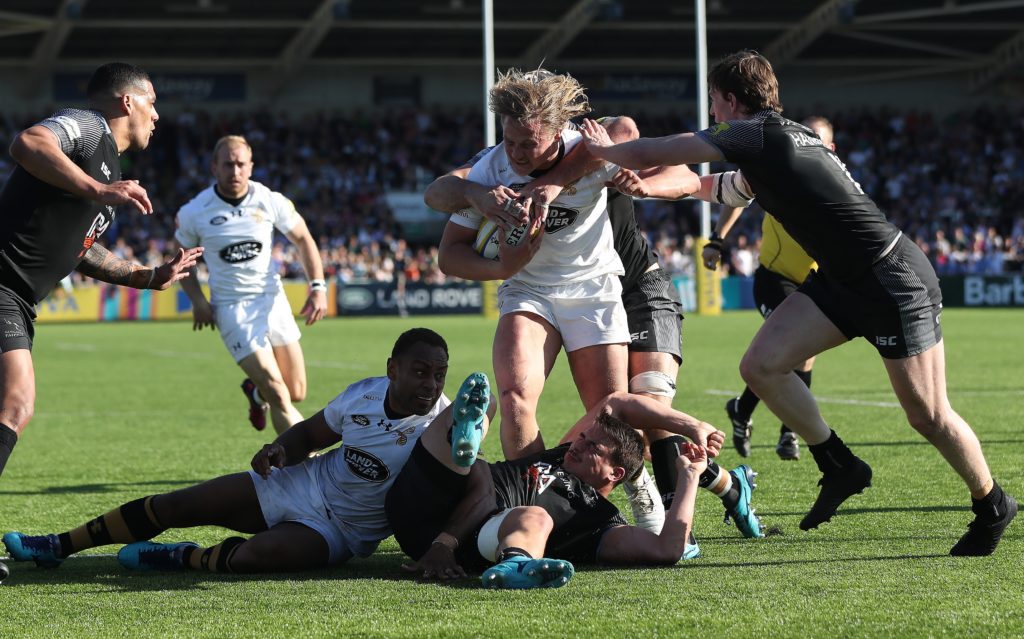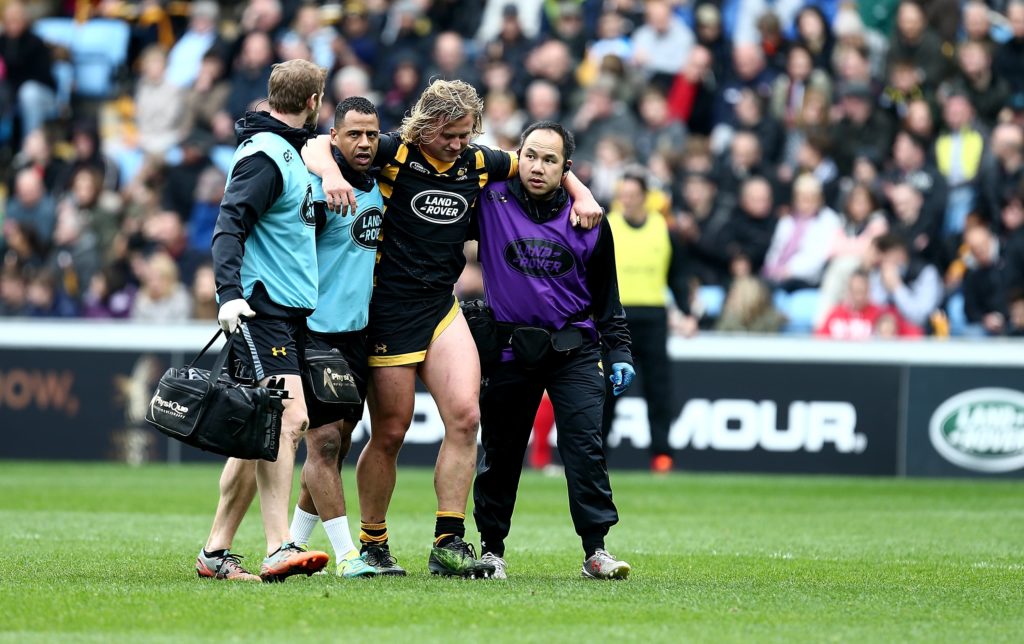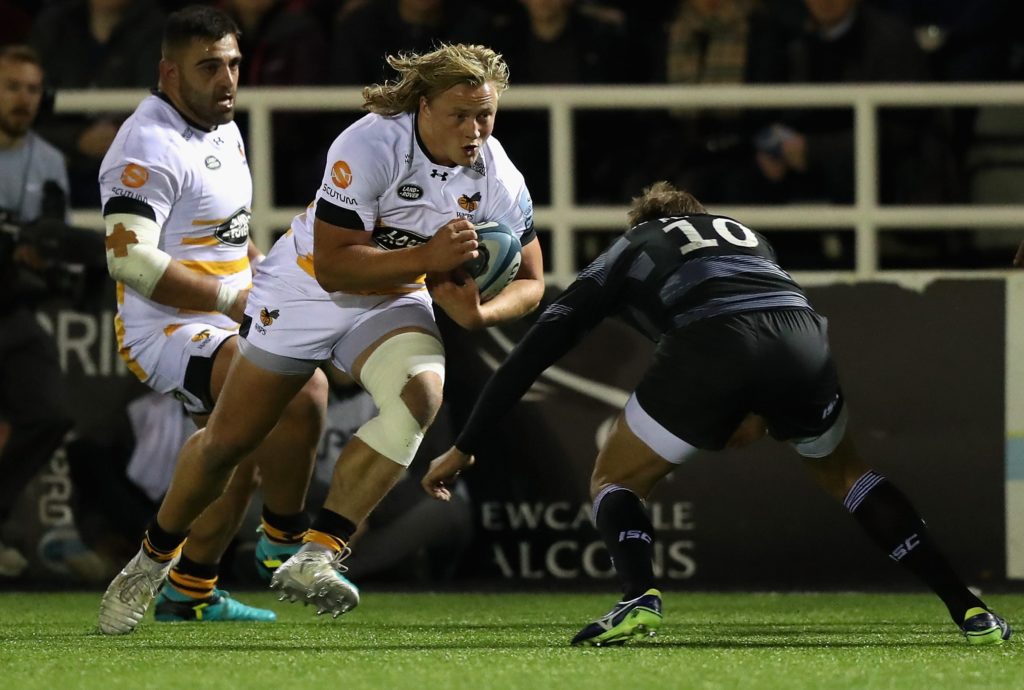Tommy Taylor slings a large arm over the top of his head. His bicep twitches momentarily and a smile slowly spreads across his face as he listens to me talk about dogs, a subject on which we are both keen. We were due to meet for a dog walk, his fox-red Labrador giving my retriever-mix a run-around, the other side of a village church, just outside Leamington Spa. It didn’t happen, because of tightened Covid restrictions just ahead of the Premiership final. So we are on Zoom; resigned, reluctantly, to the new normal.
I’m talking about the idea of provision. Of how dogs allow us to provide: a basic human condition, that of looking after another, and how they, in turn, provide us with so much. We give them food, walks, a home, love and yet the return is so much greater. It’s a bit like rugby. A game of constant provision: of ball, space, time. And off the field: so many people willing to spend their time putting back into the club they love. We give the sport so much and yet, it always feels like we’re up on the deal.
“You’re absolutely right,” Taylor says. “I got Murphy four days after I did my knee. I was meant to be going to Argentina with England. We were always going to get him, but we brought it forward. And throughout that rehab, eight months or so, I became obsessed with training him and building that relationship. It’s what got me out of bed. And I was doing that because I could see how much he loved it, how much he was in his element. And yet I was the one who was really benefiting from it all. Dogs are so pure, so happy to see you all the time. They are incredible. Everyone should have one in their life.”
There is a relaxed and earnest manner to the way the Wasps hooker speaks. He seems unfazed by my tangent, so early on in our conversation. When we first speak, we are a few days away from a big club final and I haven’t yet asked him about any rugby. But Taylor is used to taking things in his stride. 2020 has been a year of change for us all. Taylor more than most.
Throughout that rehab, eight months or so, I became obsessed with training him and building that relationship. It’s what got me out of bed.
Tommy Taylor on the love of his Labrador, Murphy
Back in March, as the world lurched on a pandemic tilt, Taylor’s microcosm was about to be turned upside down. Thirty-two weeks pregnant with their first child, his partner, Lucy, became dangerously ill.
“We knew he was always going to come early. From 28 weeks, we were having scans twice a week. They were worried by his development; he was quite small, and Lucy had been diagnosed with preeclampsia. She was swelling up and had horrendous headaches. She went into the hospital on a Thursday night for checks and we thought she’d be back home on Friday. I went for a team run with the squad but then got a phone call just before I was heading out: she said ‘It’s… (we didn’t know it was a boy then)… it’s coming today, you need to get here.’ Lee Blackett was fantastic, he just said ‘go’ and within an hour I was at the hospital and we were having an emergency c-section.”
“He was very small when he came out, 3lbs 9oz, an absolute dot, but he was screaming and breathing on his own, which isn’t always the case when they are that premature. But the first few days were the toughest. He was whisked to special care and Lucy was in a pretty bad way; both needed help. That was tough.”
Taylor brings his hand up to the back of his neck to reassure himself. Just verbalising what he has gone through is noticeably difficult. It took his partner nearly three weeks to come out of hospital. In the first week, she wasn’t well enough to even see her baby. Taylor would attend to both during the day and then return home each night on his own, increasingly separated from everyone as the pandemic gripped hold. It was an uncertain and challenging wilderness.

“The people at Warwick Hospital were amazing. The special care team: extraordinary. He was there for about four-and-a-half weeks all told. It was dicey at the start but in the end, it was just a case of him needing to put on weight and eventually he began to do that. Then we were able to get him home.”
He continues: “People will often say: having a baby is the best day of your life but I can honestly say, it wasn’t. I’ve spoken to Lucy about this: it was properly terrifying. It was a hard, hard time and really, only on the day they both came home, that was the best day, but the five weeks previous…”
These moments in extremity can reveal things about yourself. “You cope, don’t you. I was really helped by lockdown in a way; I was free to go into hospital every day. If I’d been still playing and training, I don’t know if I’d’ve been able to do it. I found out about Lucy: how incredible she was. So strong; I was blown away. The Wasps fraternity was amazing too. They made sure I wasn’t lost. They kept in contact, tried to drop in occasionally, just to see me; just to make sure I was eating.”
I found out about Lucy: how incredible she was. So Strong; I was blown away. The Wasps fraternity was amazing, too. They made sure I wasn’t lost.
Taylor smiles. We converse on, discussing his career to date; the growing up he did at Sale under Steve Diamond; the transition to Wasps; how things have evolved. How have Wasps changed under Lee Blackett?
“There is a new element of freedom and expression,”Taylor says, “which he’s allowed to happen. He’s always been that sort of man: very relaxed and calm, and it’s bred naturally, through things like the youngsters coming in and making a statement. Players like Jacob (Umaga), play with feel and enjoyment. That’s come through into us older lads. The last two years or so we’ve been restrained by a fear of making mistakes. He (Jacob) stood up in a meeting just after we lost to Leicester, just after Dai had gone, and said that we were good enough to play from our own half, our own 22, if it was on. And that hit me. I realised that I had developed quite a negative mindset. The losses had built up and closed us off; it wasn’t the way we wanted to play. Experience is really important but sometimes, those without experience can provide the answer. Lee has allowed us to listen to every voice and reflect in the right way.”
The conversation veers towards England. Fate – injuries – has dealt his international career a cruel hand. But his humility is extraordinary. His father has been asking recently if he thinks about what could have been.
“I have never played rugby to achieve anything,”Taylor says. “Every time I got into a squad, I never thought that I deserved it, as though it was a right, if that makes sense. And I never thought that I needed to do this, in order to do that. So I don’t regret things. I have one England cap. I want more, but I have something I didn’t have before. I’m lucky I have played so much Premiership rugby. It is what it is. If I hadn’t been injured for the whole of 2016/17, perhaps I wouldn’t have played in that final. My mum would like me to change the way I play, be a bit safer, but if I did that, I wouldn’t be where I am. You train and play every game as well and as hard as you can. You can’t control injuries. And there’s never a good time to pick one up.”

I speak to Taylor a couple more times after the 2020 final. Once in the week subsequent to the loss against Chiefs, and then once the day after the new season starts. He is disappointed yet positive about the loss to Exeter. He articulates how proud he was of the team’s defensive display in the wet conditions of Twickenham. How that final ‘perfect’ lineout is perhaps all that was missing. He wants the new season to come as quickly as possible and we agree to speak again after Wasps’ opening game in November.
In the intervening weeks, heartbreak hits my family as we lose our family dog, Nell. She passes away suddenly and unexpectedly, and it is the very first thing Taylor talks to me about. We talk reflectively about loss and how difficult that is with a dog. About the decisions you have to make as an owner and how you feel a bit strange calling it grief.
To change the subject, Taylor describes how the short offseason gave them a chance to attempt their first holiday as a new family. How the dread of a four-hour plane journey to Tenerife with a six-month-old ended up a dream, and how a search for the sun and a nice tan ended up as hours in the shade, looking after Taylor junior. He laughs at how much his life has changed. He also concedes there is a noticeable difference on the pitch with Wasps.
It is a strange feeling: we played badly, but won. We are in a good place.
“We lost our first game last season against London Irish in 2019. And perhaps, before, we would have lost that game versus Bristol. We didn’t play well. We were very disappointed. The intensity was way down. I guess that is what is difficult about the break we’ve had: you can only get that from playing games. But we won it. That last move, we pulled it from somewhere. That’s the difference. It’s a strange feeling: we played badly, but won. We are in a good place.”
As we bid farewell for the third and final time, I am mindful of one of our original digressions. Tommy Taylor could have been a geologist. His father had fostered an ‘outdoor life’ from an early age and he loved Geography at school. His older brother had studied ‘rocks’ at University and that was where he was headed before rugby steered him away. He agreed to take a year out before reading Geology at Manchester and he spent twelve months travelling from his family home in Macclesfield to training at Sale, while working in the evenings. It went well and the professional contract was offered to ‘the hooker with long blond hair’ and he never needed the hall of residence. Their loss was rugby’s gain.

In Taylor, I am reminded of a great saying from Herbert Harold Read, one of Britain’s most famous geophysicists. “The best geologist,” he said, “is he who has seen the most rocks.”
Taylor is a treat to talk to; his provision is constant, his integrity indisputable, and the way he listens and learns will guarantee that Wasps continue their upward curve. Top honours may well have eluded him for now but, as the last six months have shown, there is more to life than international caps and trophies. Having been where he’s been this year, the simple and steadfast process remains: he will keep on reaching for rugby’s rocks.
More from the English Premiership
If you’ve enjoyed this article, please share it with friends or on social media. We rely solely on new subscribers to fund high-quality journalism and appreciate you sharing this so we can continue to grow, produce more quality content and support our writers.


Comments
Join free and tell us what you really think!
Sign up for free